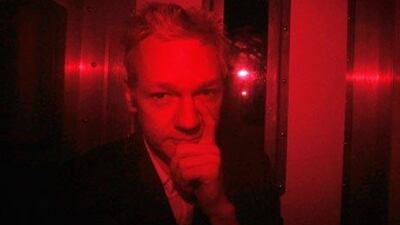LONDON // WikiLeaks founder Julian Assange, a target of US ire for releasing secret cables, returned to a London jail on Tuesday pending an appeal over a decision to free him on £200,000 ($317,400) bail for alleged sex crimes.
British judge Howard Riddle had initially granted Assange bail but prosecutors, representing Swedish authorities, challenged the decision before the 39-year-old Australian had left the court in central London.
"An appeal will be held within the next 48 hours and you will remain in custody," the judge told Assange, who nodded and said, "I understand," before being led from the dock by security guards.
Assange, who has spent a week in solitary confinement in London's Wandsworth prison, is fighting attempts to extradite him to Sweden for questioning over allegations of sexual misconduct made by two female WikiLeaks volunteers, accusations he denies. An extradition hearing is set for January 11.
Mark Stephens, a lawyer for Assange, accused Swedish authorities of persecuting him. "This is really turning into a show trial," he told reporters.
He called Assange "an innocent man sitting in Dickensian conditions, Victorian conditions in Wandsworth jail".
Assange and his lawyers have voiced fear that US prosecutors may be preparing to indict him for espionage over WikiLeaks' publication of the US diplomatic documents.
Assange has long been a thorn in the side of Washington. US anger reached new heights after WikiLeaks began publishing part of a trove of 250,000 secret cables.
Judge Riddle had earlier ruled that, pending the extradition hearing, Assange could be freed under strict conditions including electronic tagging and a curfew. He would have had to report to police daily and post a £200,000 bond.
Stephens said that raising the cash could further delay Assange's release despite backing from figures including US filmmaker Michael Moore, Australian journalist John Pilger, and Jemima Khan, former wife of Pakistani cricketer Imran Khan.
"There is a problem because he's been granted bail on condition that £200,000 cash is paid into this court here and that's an awful lot of money," he said.
"It's a pity that he can't use Mastercard or Visa in order to assist him to arrange that," Stephens added in a swipe at two credit card companies targeted by activists for blocking donations to WikiLeaks. Riddle denied Assange bail a week ago on grounds he might abscond but said he had changed his mind because Assange had provided a British address and because discrepancies over his passport and right to stay in Britain had now been resolved.
Assange is alleged to have sexually molested one woman in Sweden by ignoring her request to use a condom when having sex with her. Another woman alleged Assange had sex with her without a condom while she was asleep.
Defence lawyer Geoffrey Robertson said the rape allegation against Assange came under the least serious of three categories outlined in Swedish law.
"In this country the word rape rings all sorts of alarm bells. When we look at the Swedish system...it is very, very different. We doubt this category would be rape under English law," he told the court.
Prosecution lawyer Gemma Lindfield, acting for the Swedish authorities, contested this and said nothing had changed.
"He remains a significant flight risk and no conditions that court can impose could prevent his flight," she told the court.
Assange, wearing a navy suit and open-necked white shirt, spoke only to confirm his name, age and address.
He sat impassively behind tall panels of thickened glass during the initial hearing, which lasted a little over an hour.
One of the main conditions of his bail is that he lives at Ellingham Hall, a country mansion in the county of Suffolk in eastern England that is the home of a former army officer and Assange supporter, Vaughan Smith.
Two of Assange's backers took the witness stand to offer £20,000 each to act as a surety.
Smith called him as a "very honourable person, hugely courageous, self-deprecatory and warm".
However, he clearly divides opinions.
An ABC News/Washington Post poll released on Tuesday showed that 59 per cent of Americans believed the United States should try to arrest Assange and charge him with a crime related to the disclosure of the cables.

